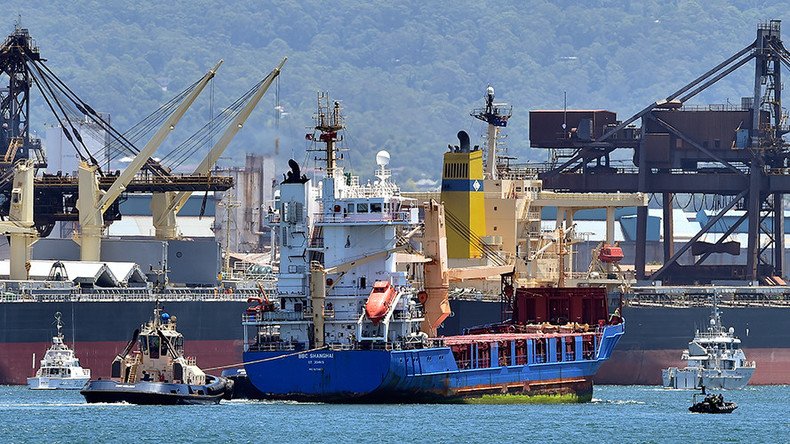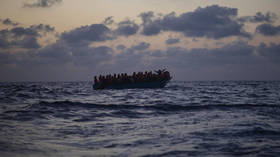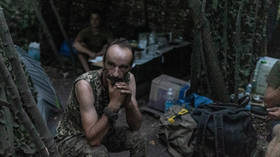'Don't waste Australia': Aussie govt under fire over nuclear waste shipment, fears of global dump

Australia has received 25 tons of its own reprocessed nuclear waste that is still feared to contain plutonium. The waste will be housed at the Lucas Heights reactor until a new site is built, amid concerns the country may become a nuclear dumping ground.
About a dozen Greenpeace protesters, some carrying signs such as "Don't waste Australia," stood near the entrance to Port Kembla, south of Sydney, as the BBC Shanghai ship arrived on Saturday.
Greenpeace has questioned the safety of transporting some 25 tons of waste, generated by the Australian Nuclear Science and Technology Organisation (ANSTO) and sent to France in 2001 to be reprocessed.
Embedded in glass and placed inside a reinforced protective container, it's the first such shipment to be returned to Australia after reprocessing, designed to make it safe for long-term storage. The complex process involves the removal of uranium and plutonium before placing the remaining substances in a special container.
BLOG: No place for nuclear waste https://t.co/3TINxrY6up HT @DaynePratzky#dodgyWastepic.twitter.com/ZlFYMkTEG5
— End Coal (@endtheageofcoal) December 6, 2015The French Nuclear Safety Authority has allegedly revealed to Greenpeace that the waste has been classified as high-level waste according to standards set by ANDRA, the French national radioactive waste management agency. High-level waste appears to be agency’s most severe nuclear waste classification.
Greenpeace’s investigation claims to have found the waste still contains quantities of plutonium, despite reprocessing by French state-owned nuclear company, Areva. However, the Australian authorities (ANSTO) reportedly classified the shipment as intermediate-level waste, using an alternate classification system.
Tell @cpyne not to turn Australia into a nuclear waste dump #DodgyWastehttps://t.co/g8IwIbKatA
— Julie Wines (@JulieWines) December 6, 2015“The Australian government is downplaying the danger of this shipment, saying it is intermediate-level waste that isn’t harmful unless mismanaged. But we know it contains plutonium and is classified as high-level [long-life] waste by the French authorities,” Emma Gibson, Greenpeace Australia Pacific’s Head of Programs, said on the organization’s website.
On top of it, according to Gibson, the BBC Shanghai has a worrying safety record and has been banned by a number of countries. Official documents seen by Greenpeace show the vessel has been detained by Australia, the US and Spain in the past five years after failing safety checks. The US has banned “this junkyard ship” from carrying government cargo, while 14 other nations have found deficiencies in the vessel since 2002, Gibson said.
"This is not the kind of ship you would want to see transporting nuclear waste," Gibson told AFP following the BBC Shanghai ship on Saturday aboard a boat.
Stop Australia becoming an International Nuclear Dumpsite! https://t.co/paIWHaAuRq
— Hilary PatersonJones (@twittyhilster) December 6, 2015The government has meanwhile shortlisted six sites for a permanent nuclear waste dump. Phil McCall, ANSTO spokesman, argues that Australia had a responsibility to take back the waste that it had produced.
"It is in line with international best practices that the countries that benefit have the responsibility to deal with the waste," he said, according to Reuters.
“The government is now saying Australia could be a nuclear waste dump for the rest of the world. Imagine the corners that could be cut when these dangerous shipments arrive regularly,” Gibson noted.
@GreenpeaceAustP
Port Kembla from where nuclear waste is to be transported to Sydney & stored #dodgywastepic.twitter.com/IuCDXwb8FQ
— Greenpeace Aus Pac (@GreenpeaceAustP) December 5, 2015Greenpeace maintains that a poll of some 3,144 people late last month suggested that most Australians opposed the government's plans to store nuclear waste for other countries. Asked about Australia accepting nuclear waste from overseas, 18.3 percent supported it, 72.1 percent opposed it and 9.6 percent were undecided.
"Most Australians rightly don't want their country to become a nuclear waste dump for the rest of the world," Gibson said in a statement. "Nobody has yet worked out a safe way to manage long-term nuclear waste, which can remain dangerous for hundreds of thousands of years."












